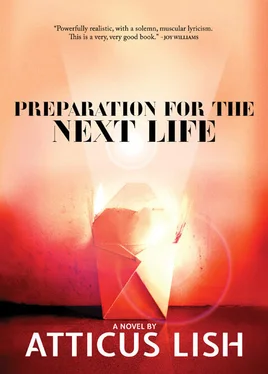Skinner opened a dark-stained wooden door.
Go on.
She went into the social club with her arms crossed.
Have a drink.
I don’t drink.
Why not?
I don’t need it. I think I have to make some decision.
You can have a drink. Since when does that interfere with a decision?
She was sitting on the stool like a statue. A bad feeling had developed between them. She got down from the bar stool and left.
Skinner caught up with her on Main Street, catching her by the elbow and turning her around.
What are you doing?
He was making an effort to contain his anger.
I am leaving.
What for?
You don’t need me.
What do you mean I don’t need you?
She crossed her arms and stared away from him and wouldn’t talk. Night was falling. He asked her what he did wrong. She didn’t say anything. He was left looking at the side of her face. Her jaw was set. He had been angry to begin with. Her silence had an effect on him and he started goading her, insulting her on the street. Tell me what your problem is. He started breathing, waiting for her to speak. He had become enraged. You’re so goddamn perfect. Tell me one reason why your opinion matters.
His voice rose.
Tell me what you’ve done. Why I should care.
Zou Lei blinked but didn’t speak.
A Chinese man noticed them fighting and watched.
You too good to talk to me now?
Skinner took a step back to protect her. He was afraid to be near her when he lost it. He waited for her to say something — stop me, he thought — but she didn’t and he ignited.
Hey! he bellowed. Hey! You motherfucking look at me! He had his face an inch from her face. I treated you like a human being!
She flinched. All over the street, people started looking.
He wheeled and walked into a turbaned construction worker dead-on, shoulder-butting him. The man fell back a step.
Hey, buddy!
Is there a problem? Is there? Is there?
The Sikh swore and threw his Sawzall in his truck.
Black kids pointed out the scene to their friends, smiling silently.
Skinner on his way to nowhere, sailing down Roosevelt, kicked a sheet of plywood that leaned against the parking lot fence and it made a deep reverberating echo in the street.
He would probably have broken a window and got himself arrested.
A force flew by — Zou Lei — she stopped and blocked his path. The sight of her gaze hurt his eyes. She was nearly choking. The words came spitting and wrenching out of her. He understood nothing, and he realized she was speaking in another language.
I don’t know what you’re saying.
Don’t know what you’re saying, she mocked.
Then he blinked and she was halfway across the street.
Wait a minute, Skinner said, and took off after her.
She broke into a run.
Skinner ran after her, thinking he would catch her inside ten yards.
But instead of letting him catch her, she started accelerating, and within seconds, they were in a dead heat with her in the lead. She was leading them towards the projects, the derricks, and the water. There were a scattering of people coming the other way, and they moved aside from the force of the two runners, Zou Lei light and spring-loaded and Skinner on her tail, his desert boots whopping the pavement.
She made the corner and took them between the projects on the left and the unseen water on the right. She took them under a high stone bridge that crossed the avenue and led them uphill, the projects left behind, and the blackness of the canal no longer visible. To their right, across the wide boulevard, there was now a line of two-story houses and then, spotlit in snow-white sodium lights, were warehouses in sheet-metal buildings the size of airplane hangars. The cash and carry. On the left, they were running by store windows, some of them lit, some of them dark. Zou Lei fled through squares of light and dark and Skinner followed.
The pace of the run was now starting to tell on him. All the symptoms started. His breathing was coming hard, his legs were getting heavy, his blood was thickening, caramelizing like sugar in a hot pan and turning to acid. The feeling of slow-drowning beset him, the knowing you’re not going to catch her. He could hear his boots hitting the sidewalk as he hung on.
He looked ahead at Zou Lei to see if she was fatiguing. Through his sweat-burning eyes, his viewfinder bouncing up and down, he could see her running light and whiplike.
The warehouses were back there somewhere. The terrain was changing. She took him across a parking lot in front of a diner. He caught a blurred glimpse of Steaks — Chops — Seafood and the words stayed with him in a dumb chant until he forgot them in his battle to keep pace. Beyond the diner, there were areas of a greater, bluer darkness that he could not interpret and he tried to guess where she was taking him, but he couldn’t think and he stopped trying.
She’s fucking fast, he thought.
They were crossing an area where the asphalt had been stripped off the boulevard and he was thinking: be careful not to step in a hole — but not acting on the thought, unable to do anything but keep going, balanced on the edge of pain he could barely make himself tolerate, and just lucky he didn’t step wrong and pop his ankle.
Now they were running under a scaffolding framed out of two-by-fours and plywood. She cleared the end of the wooden tunnel before he did and he lost sight of her for several seconds and then cleared the tunnel himself and picked her up again, perceiving the running woman as a shadow on the greater field of darkness.
They were far from the lights of stores. They were in a concrete expanse of road, a highway rising from the darkness, headlights shooting up the ramp in bursts like tracer rounds. She tromped over the caved-in sidewalk and veered out into the deserted roadway. Skinner made out trees, the small pale flags of littered paper blown against a fence, a field. A board rattled underfoot, then he had crossed the roadway, and he felt his boots thudding on dirt.
Now there was the chance of losing her because the field was blackness all around. As he ran, he panned his eyes for silhouette or movement and, seeing nothing, kept running blind. He felt his legs slowing because he could not see her and he was lost. But he kept milling onward, now hoping not to catch her but just not to lose her — to stay with her and follow her and meet up with her at the end, wherever that would be.
His night vision began accumulating enough to see the ever-shifting patch of ground in front of him where his boot was landing, dry grass over dirt. He sank into the mindless drone of dropping one boot in front of the other and striving for nothing more than staying with his team. When his legs slowed, he sped them up again. Still he couldn’t see her.
From time to time, he raised his head. Saturated with dark energy, the sky glowed like a television screen after the power gets turned off. On either wing, he saw distant lights and buildings. He was running in an endless field. He tripped but didn’t fall. It cost too much to swear. Even to think what he would say. His horrendous breathing was disconnected from him. The next time he raised his head, he saw amber vapor lights coming through the trees. He now caught sight of a silhouette the size of a front sight post migrating laterally against the amber glow and knew it was her. He huffed the sweat off his lip. The front sight post disappeared and emerged again, separating from the ink blot of a tree, light shimmering like mercury around the branches.
Houses came in view between the trees, a street bathed in the spectrum of the lights. He could not see a fence but learned that there was one when he saw her figure rise and hang above the dark earth. Then he blinked and she was in the street among the houses. Not wanting to lose her, he pounded after her until the fence appeared like something being brought to the surface of water. He hit the fence and was climbing over it, the wire clashing and rattling.
Читать дальше












